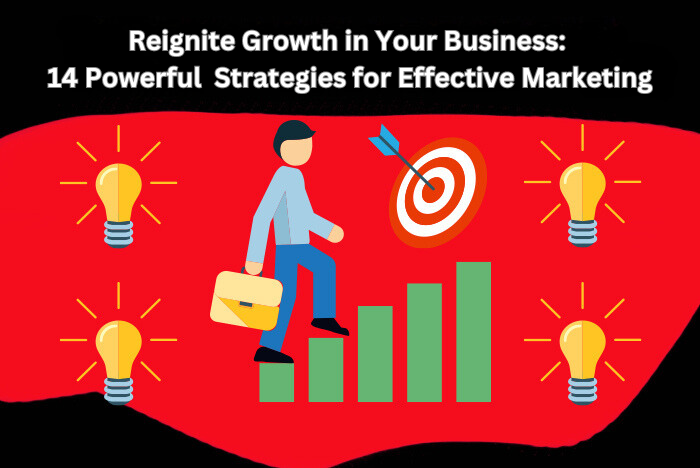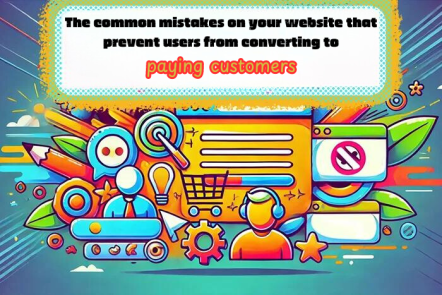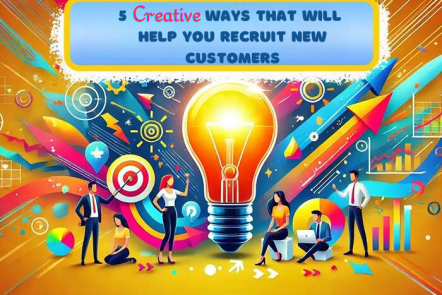It’s here and it’s official: we’ve collected 14 ways to market your business
The success of a business largely depends on its ability to market itself effectively. With the arrival of digital technology, there are many ways available for businesses to explore and leverage. From building a responsive website to marketing on TikTok, the possibilities are vast. We’ve rounded up the 14 ways to market your business effectively, hoping it will put you in order.
From building a website to partnering with businesses – 14 ways to market your business
Building a responsive and user-friendly website
One way to market your business in today’s digital age is by establishing a strong online presence through a responsive and user-friendly website. A website builder like WordPress can make it easy to create a professional-looking website. However, it is essential to ensure that your website is optimized for mobile devices, as an increasing number of users access the internet through smartphones and tablets. Also, a well-designed website not only improves credibility but also provides a smooth browsing experience for visitors, encouraging them to explore your products or services more.
Develop a content-based marketing plan for your blog
Content marketing has emerged as a powerful tool for businesses to connect with their target audience and drive traffic into their website. By developing a content-based marketing plan for your blog, you can create valuable content and information that resonates with your audience. Whether it’s industry insights, instruction manuals, or case studies, delivering valuable content establishes your authority in your niche and fosters trust with potential customers. Regularly updating your blog with fresh and relevant content not only keeps visitors coming back, but also improves your search engine rankings, and improves your visibility online.
Development of a content-based marketing plan for social networks
In addition to blogging, social media marketing offers a dynamic platform to connect with your audience on a more personal level. Platforms like Facebook, Instagram and TikTok provide businesses with the opportunity to share engaging content, interact with followers and build brand awareness. By developing a content-based marketing plan tailored to each social network, businesses can effectively leverage the unique features and demographics of each platform. Whether it’s sharing behind-the-scenes glimpses, hosting live Q&A sessions, or running surveys and contests, engaging content encourages user interaction and fosters a sense of community around your brand.
Use customer relationship management (CRM) tools
Of all the ways to market your business, customer relationship management (CRM) tools play a crucial role in maintaining and nurturing customer relationships. By leveraging CRM software, businesses can streamline communication, track interactions and personalize marketing efforts based on customer preferences and behavior. From lead management and sales tracking to sending targeted email campaigns, CRM tools enable businesses to effectively manage their customer life-cycle and drive conversions.
Improve presence on search engines like Google – SEO
With millions of websites competing for attention, improving your Google presence is essential to driving organic traffic to your site. Organic Google SEO or search engine optimization (SEO) involves optimizing your website and content to rank higher on search engine results pages (SERPs) for relevant keywords. By doing keyword research, optimizing meta tags, improving website speed and building quality back-links, businesses can improve their visibility and attract more qualified leads. Consistently monitoring and refining your SEO strategy ensures that your website maintains its position in search engine rankings and continues to drive traffic over time.
Using an advertising platform such as Google Ads
In addition to organic search, businesses can improve their visibility through paid advertising platforms like paid advertising on Google. Google Ads allows businesses to create targeted ads that appear at the top of search results for specific keywords, making them visible to users actively searching for products or services like theirs and get results within 24 hours. With Google Ads, businesses can set their budget, target specific demographics and track the performance of their campaigns in real time, enabling optimization and refinement of messages to maximize ROI.
Using an advertising platform such as Facebook ads
Similarly, Facebook advertising for businesses provides a powerful way to reach and drive a highly targeted audience. With more than two billion active users, Facebook offers unprecedented targeting options based on demographics, interests and behaviors. Businesses can create visually appealing Facebook sponsored posts, carousel ads or video ads to capture their audience’s attention and motivate them to action. By leveraging Facebook’s advanced analytics, businesses can track the performance of their ads, identify areas for improvement and optimize.
Use tools to analyze and measure marketing performance
Analyzing and measuring marketing performance is essential for making informed decisions and optimizing strategies for maximum impact. With a wealth of tools available, businesses can track key metrics across channels and campaigns to gain valuable insights into their effectiveness. From web analytics platforms like Google Analytics to social media management tools like Hootsuite, businesses can monitor metrics like website traffic, engagement rates, conversion rates and ROI on any campaign types on Facebook, Instagram or any digital platform you want. By defining specific goals and KPIs, businesses can evaluate the success of their marketing efforts and identify areas for improvement. Advanced analytics tools offer features such as split testing, tracker analytics and attribution models that allow businesses to dig deeper into the data to uncover trends and patterns. By leveraging these insights, businesses can refine their strategies, allocate resources more efficiently and drive better results.
Establish a comprehensive community around the business
Building a community around your business is more than just gaining followers or marketing a business on Facebook; It’s about fostering real connections and creating a sense of belonging among your audience. Engaging with your community through forums, social media groups and interactive events helps create a two-way dialogue where members can share experiences, ask questions and provide feedback. By actively participating in discussions, addressing concerns and introducing user-generated content, businesses can foster a loyal community that champions their brand, increase reach and drive organic growth.
Use of time and task management tools and services
Effective time and task management is essential to maximizing productivity and minimizing stress. Using tools and services such as project management software, calendar apps and task trackers can help streamline workflows, prioritize tasks and ensure deadlines are met. By centralizing communication, delegating responsibility and automating repetitive tasks, businesses can streamline their operations and free up time to focus on strategic initiatives and growth opportunities.
Create unique and exciting campaigns
In a crowded market, your ability to stand out and stand apart requires creativity and innovation. Creating unique and exciting campaigns that capture your audience’s attention and echo their interests is key to driving engagement and fostering brand loyalty. Whether it’s paid advertising on YouTube, launching a viral social media challenge, hosting an interactive live event or partnering with influencers to create buzz, memorable campaigns leave a lasting impression and differentiate your brand in the consumer consciousness.
Benefits of collaborating with other businesses
Collaborating with other businesses can provide countless benefits, from expanding reach and access to new markets to sharing resources and expertise. By collaborating with complementary brands or industry colleagues, businesses can leverage each other’s strengths and create mutually beneficial opportunities for growth. Whether it’s co-hosting events, cross-promoting products, or pooling resources for shared marketing campaigns, collaboration fosters innovation and opens doors to new possibilities, ultimately driving collective success.
Create a great customer experience
In today’s competitive landscape, a great customer experience is immeasurably important for building loyalty and nurturing repeat customers. From first contact to post-purchase support, every interaction shapes your brand perception in the eyes of the customer. By prioritizing superior service, personalized communications and seamless transactions, businesses can create memorable experiences that exceed customer expectations and inspire loyalty. Investing in training, adopting customer-centric policies, and asking for feedback are essential steps in continually improving the customer experience and maintaining a competitive edge.
Implementation of referral programs to increase customer loyalty
Referral programs offer a powerful way to harness the loyalty of existing customers and incentivize them to become brand advocates. By rewarding customers for referring friends, family or colleagues, businesses can tap into their existing networks and acquire new customers at a fraction of the cost of traditional marketing channels. Whether it’s discounts, exclusive benefits or loyalty points, referral programs not only increase customer acquisition but also foster a sense of community and strengthen relationships with existing customers. In addition, they provide valuable insights into customer behavior and preferences, allowing businesses to tailor their offerings and improve customer satisfaction.
In conclusion,
Marketing your business effectively requires a multifaceted approach that includes a variety of strategies and tactics. From establishing a strong online presence and engagement with your audience to leveraging advertising platforms and analyzing performance metrics, there are countless ways to reach and connect with your target market. By embracing innovation, creativity and collaboration, businesses can navigate the evolving landscape of Digital Marketing and position themselves for success. Ultimately, investing time, resources and effort in comprehensive marketing strategies not only increases brand visibility and drives sales, but also fosters long-term customer relationships, laying the foundation for sustainable growth and market success. So, whether you’re a fledgling startup or an established organization, exploring and implementing diverse marketing strategies tailored to your unique goals and audience is the key to competitive advantage and achieving your business goals, and if it still seems complicated to you, you can turn to an internet marketing company to do the work for you.




